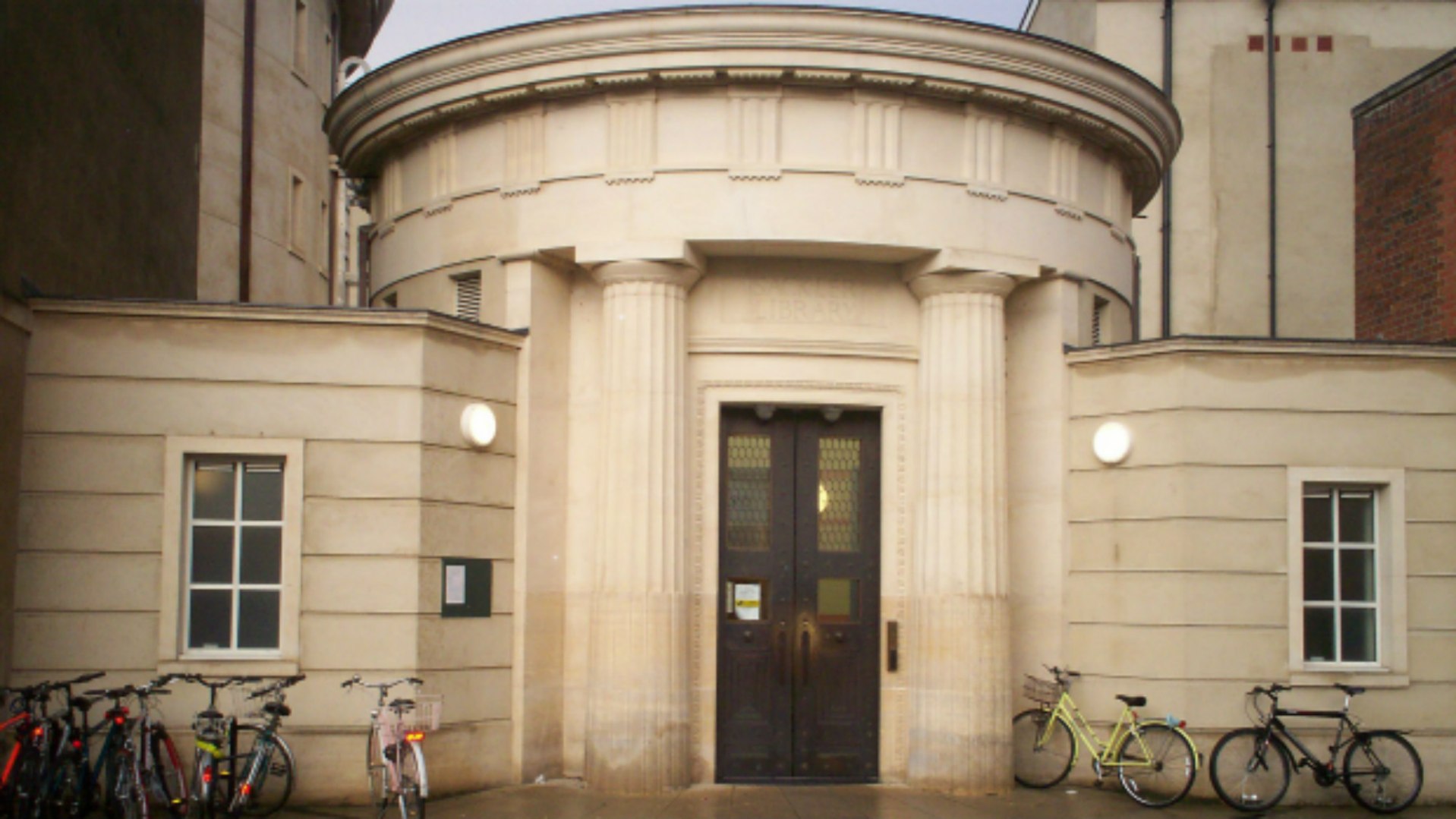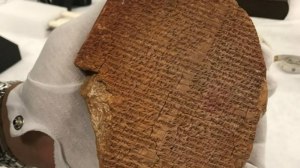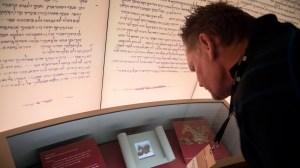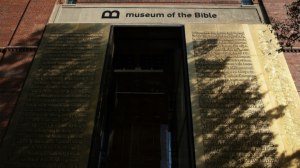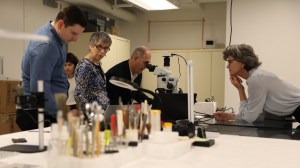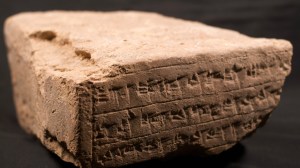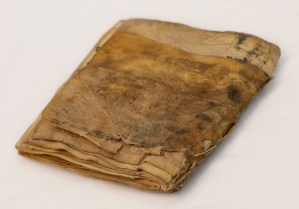In this series
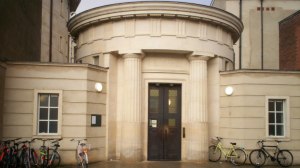
An Oxford professor has been arrested on allegations of stealing and selling as many as 120 ancient pieces of papyrus, including a fragment of the Gospel of Mark once believed to be the oldest New Testament text ever discovered.
Dirk Obbink, professor of papyrology and Greek literature at Christ Church Oxford, was arrested on March 2. News of the arrest broke last week in the student newspaper The Oxford Blue. Obbink allegedly took the fragments from the Egypt Exploration Society’s collection of about 500,000 artifacts discovered in the ancient city of Oxyrynchus. The collection is housed at Oxford’s Sackler Library, and Obbink was one of three scholars charged with overseeing it until he was removed under a cloud of suspicion in 2016.
Obbink has denied the allegations in an official statement and said the evidence against him was “fabricated in a malicious attempt to harm my reputation and career.”
The evidence is convincing, however, to some who’ve worked closely with Obbink.
“It’s difficult seeing this ending well for Dirk,” said Jerry Pattengale, a professor at Indiana Wesleyan University and one of the founding scholars of the Museum of the Bible. “It’s sad to think that such a gifted mind might have an abbreviated contribution to the field of Greek papyrology.”
Obbink, originally from Nebraska, went to Oxford in the late 1990s and became director of a project to digitize ancient papyri. The Oxyrynchus collection is a massive trove of documents, including many biblical passages, uncovered in the ruins of a Greek city in Egypt in the 1880s. Much like the Dead Sea Scrolls, the fragments have given modern scholars a broad window into the ancient world and affirmed the reliability of biblical manuscripts.
Obbink became one of the trio of editors responsible with publishing the Oxyrynchus Papyri and overseeing the scholars who were given access to the collection. He was awarded a MacArthur Fellowship—known as the “genius grant”—in 2001 for his skill in rescuing and interpreting ancient manuscripts.
Report of major discovery
Obbink attracted the attention of some evangelical scholars in 2011 when he informally shared news about a fragment of Mark’s Gospel found in the collection. Obbink told Pattengale and Scott Carroll, two scholars who were working with the Museum of the Bible at the time, that the fragment dated to the late first century. The manuscript included a bit of the text of Jesus’ baptism, where John the Baptist tells the crowd, “I baptize you with water, but he will baptize you with the Holy Spirit” (Mark 1:8).
According to Obbink, the words might have been copied down within 30 years of the date of the original biblical manuscript. There are no known biblical manuscripts from earlier than the second century, so this was a major discovery. (The fragment is now believed to date to the second or third century.)
Carroll passed the news to Daniel Wallace, executive director of the Center for the Study of New Testament Manuscripts, and Wallace mentioned the purported discovery in a public debate with Bart Ehrmann, a religious studies professor at the University of North Carolina at Chapel Hill, in February 2012.
The news created a buzz but wasn’t followed by any additional information. There was no academic paper substantiating the claims. A number of scholars who said they had seen the fragment told other scholars at the time that they were not allowed to talk about it because of non-disclosure agreements. Questions about the Gospel discovery went unanswered.
Alleged antiquities sales
At about the same time, Obbink reportedly took 13 bits of papyrus and sold them to Hobby Lobby. The sale did not include the Mark fragment but did include parts of Genesis, Psalms, and Romans, according to the Egypt Exploration Society (EES).
Steve Green, the president of Hobby Lobby, was buying thousands of artifacts for the Museum of the Bible, which he launched in 2017. He ultimately ended up with a collection of about 60,000 objects, including about 17,000 tablets, seals, and fragments that were likely looted from Iraq and Egypt; 16 pieces of the Dead Sea Scrolls that were later discovered to be forgeries; and 13 bits of papyrus that were improperly taken from an Oxford library. (Green has recently apologized, and the Museum of the Bible in Washington, DC, is in the process of returning all the stolen artifacts and developing an exhibit on antiquities forgery.)
Then in 2013, Obbink allegedly sold Hobby Lobby four more fragments from the gospels of Matthew, Mark, Luke, and John, each from “Egypt Circa 0100 AD,” according to the purchase agreement that appears to be signed by Obbink. The amount paid for the fragments is unknown, though Pattengale called it a “considerable sum.”
The purchase agreement stipulated that the physical documents wouldn’t be transferred to Hobby Lobby for four years but would stay with Obbink for research. During the period, news that the Museum of the Bible owned the exciting new discovery of a possible first-century fragment of the gospel of Mark prompted EES to clarify that the papyrus was not for sale and had never been for sale. Then the Museum of the Bible produced the purchase agreement, and an investigation began.
Internal investigation
EES launched a systematic check of the collection, to see what else might have been stolen. They found that not only were more than 100 fragments missing, someone had removed the catalogue cards and the photograph recording the items location in the collection.
Seven were found in California, in the private collection of Andrew Stimmer, chairman of Hope Partners International, an evangelical ministry serving children in Costa Rica, Kenya, and India. To date, it is not clear how Stimmer got the texts, which included bits of Exodus, Ecclesiastes, and 1 Corinthians. He has agreed to return them to Oxford.
Obbink was not reappointed to his editorial position in 2016. In June 2019, EES blocked Obbink from even accessing the collection, and in October, Obbink was suspended from Oxford. The next month, local police received a report that as many as 120 artifacts were stolen from the Oxyrynchus Collection at the Sackler Library. The police investigation is ongoing.
It is not known how much the stolen antiquities are worth. Carl Graves, director of EES, said he doesn’t think of the objects in those terms.
“They are testament to Egypt’s early Christian heritage and are early evidence of biblical Scripture,” he told the Guardian. “We don’t value them monetarily but they are priceless and irreplaceable.”
Money corrupts
According to Pattengale, however, the money the Green family spent acquiring artifacts for the Museum of the Bible caused a number of people to seem to go crazy. “We were approached by dealers … in the oddest of ways,” he wrote in CT.
“After speaking at Liberty University, I went to shake a fellow’s hand at the end of the greeting line. Instead, he pulled out a paper tube from beneath his trench coat and tried to show me a Megillah (Esther scroll) he wanted to sell. … One fellow kept calling about a buried boxcar of antiquities in Texas, another claiming ownership of something from Jesus’ birth stable, and yet another with plaster casts of the first-century tomb in Jerusalem.”
Obbink may have also been motivated by the possibility of the money. But unlike most people, had access to half a million antiquities.
Christopher Rollston, professor of Semitic languages and literatures at George Washington University, said money has done a lot of damage to the study of biblical antiquities.
“The antiquities market is a blight on the field,” Rollston said. “It is corrosive and destructive, and scholars, museums, and the public must have nothing to do with it. Those who do, do so at their peril, as this tragic story demonstrates in spades.”

